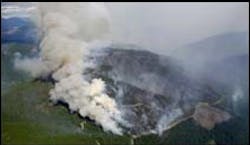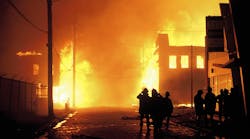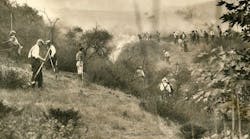COLUMBIA FALLS - Not long after two commercial jetliners crashed into the towers of New York City's World Trade Center, plumes of smoke began rising in the forest north of Columbia Falls. On any other day, helicopters would be hovering over those early morning plumes, dumping water on the wildfire that has raged there for most of a month. But Tuesday morning, all flights were grounded across the United States, and that includes the helicopters fighting the Moose fire. "We have six choppers ready to go, but they're just sitting here," fire information officer Tom Danton said early Tuesday. "We can't even fly them the 15 miles from fire headquarters to the hotspots. Today, we have to do it with ground crews." But by noon even the ground crews were grounded. "They were just too distracted by everything that's happening to keep their attention on the fire line," Danton said later in the day. "And in this business, you're not safe if you're not paying attention, and safety's the first requirement for us." So instead of working the fire lines, crews were back in camp Tuesday, hovering around a handful of big-screen televisions brought in to share the news. Meanwhile, hot spots and flare-ups continued to send smoke up from deep inside the perimeter of the 66,800-acre wildfire. The fire, which has burned about 25,000 acres in Glacier National Park, recently has been beaten back by cold, wet weather, but Monday evening started flaring again, driven by dry winds. Although smoke columns again reach into the sky, Danton said, the fire is torching internally and is not expanding its perimeter. Helicopters had been a key tool to making sure predicted winds do not bring the blaze back to life, he said. But "no flights, nowhere, no questions," is how the orders came in from the East Coast on Tuesday morning, Danton said. The shutdown of American air space also has stranded many of the fire management team that has been living in a tent city north of Columbia Falls for the past two weeks. Tuesday was to be "transition day," when the Type I fire team pulled out, leaving management of the fire to a smaller Type II team. The problem is, many of those Type I team members are from distant corners of the West, places like Arizona, New Mexico and Utah. They planned on flying home Tuesday after handing over the Moose's reigns to the new team. Now, they sit, waiting for the green light to fly again. "I suppose they'll just stay put," Danton said. "Maybe take a nap if they want to." The fire managers prepared to ship out are not the crews actually tackling the fire, Danton said, but rather are the overhead teams who make strategic firefighting decisions and oversee the logistics of a mobile and makeshift firefighter city. Because the Type II team members already have arrived, the Type I leaders will have little to do while delayed in the Flathead. After all, "you don't need two bosses," Danton said, "and the ground crews aren't affected by the management transition." Between grounding the firefighting helicopters and stranding the management team, he said, Tuesday's attacks on the East Coast "have totally messed up our transportation systems." For some who had been working the fire, however, the East Coast attacks represent something substantially more important than an inconvenience. "Quite a few of our firefighters were concerned about their friends and families," Danton said. "It's like a war, and it's hard to concentrate on your job in the middle of a war." Crews will return to the fire line "when we feel the emergency of the moment has settled a bit," he said. Meanwhile, the emergency of the moment continues to demand the full attention of fire crews, especially those with family near the disaster. "One person in our office has a sister who works in the Trade Center," Danton said. "He's been trying desperately to contact her, but all the phone lines are tangled up back there. He has no idea if she's OK." Reporter Michael Jamison can be reached at 1-800-366-7186 or at [email protected].
Voice Your Opinion!
Voice Your Opinion!






